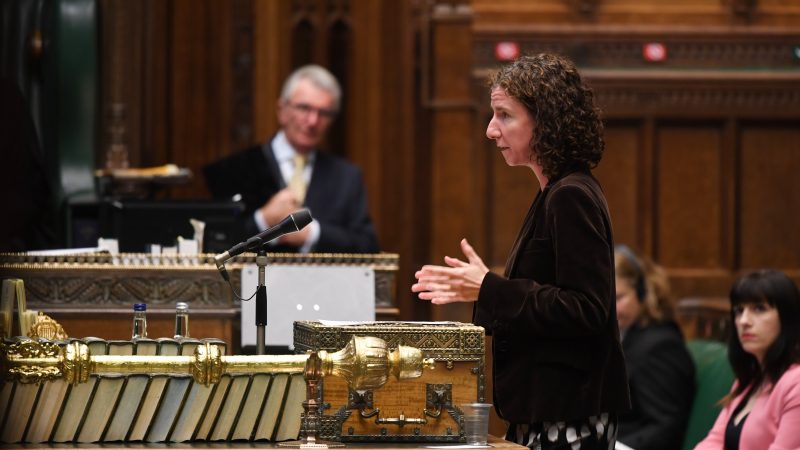
Anneliese Dodds has called on the government to bring forward an “economic package that acknowledges reality and gets ahead of the problems we face” in the coronavirus pandemic this winter.
In an opposition day debate on economic support during Covid, the Shadow Chancellor demanded a “wage support scheme that works properly, a safety net worthy of the name” and financial support to run alongside any restrictions.
Dodds outlined the inconsistent approach seen from the Conservatives on financial support in the coronavirus crisis, highlighting that while Liverpool recently received just £3.49 per head in support, others such as Leicester were given £7.30.
She asked why the government has not used £1.3bn of unspent emergency funding to support businesses that need help. The government recently required areas to repay any of the unspent cash given to councils earlier in the crisis.
Dodds also again pushed the Chancellor to fix the problems with Universal Credit, uprate the local housing allowance to median market rents, scrap the benefit cap and abolish the two-child limit on UC and tax credits.
She raised the provision for self-employed workers in the crisis, saying: “The government has left yawning gaps in their offer… From the start of next month, the support available will fall from 70% of pre-crisis profits to just 20%.”
The Shadow Chancellor finished her contribution to parliament this afternoon by telling MPs: “If we are to avoid the bleakest of winters, this government has to get a grip. We need a national reset.
“For that to work, we need an economic package that acknowledges reality and gets ahead of the problems we face; a wage support scheme that works properly, a safety net worthy of the name, and financial support that goes hand in hand with the imposition of extra restrictions.”
But Rishi Sunak responded to the concerns raised arguing, as the Prime Minister has done, that providing comprehensive economic support would undermine the ability of the government to fund the NHS and other public services.
He argued: “We must prevent the strain on our NHS from becoming unbearable, but we must also acknowledge the stark reality of the economic and social impacts of another national lockdown. The costs of doing that are not abstract—they are real…
“The Prime Minister was absolutely right when he set out our desire for a balanced approach, taking the difficult decisions to save lives and keep the R rate down, while doing everything in our power to protect the jobs and livelihoods.”
The motion from Labour, which called on the government to “do what it takes to support areas with additional local restrictions” and reform the job support scheme to incentivise employers to retain workers, was defeated by 338 votes to 261.
But the government lost a vote on a motion of regret tabled by Labour in the House of Lords this afternoon, over the government’s failure to implement an effective test and trace system, by 256 to 250 votes.
Members of the government and Conservative MPs were conspicuously absent from the debate today, which was scheduled by the Labour Party on just one of 20 days in the parliamentary calendar on which the government does not set the agenda.
Charlotte Nichols MP tweeted: “There’s not currently a single Tory MP in the chamber, other than the minister responding to the debate, for the Covid-19 economic support package debate.”
Sunak recently U-turned and announced his new ‘job support scheme’ after having resisted calls to introduce support to replace furlough, ending this month. The new programme will run alongside the already unveiled ‘job retention bonus’.
Under the new scheme, people who work at least a third of their normal hours will have their worked hours paid as usual with the government and their employer each covering 33% of the hours not worked.
The job retention bonus, announced by the Chancellor in July, will see employers get a £1,000 bonus for each furloughed employee that they bring back to work and keep on the payroll until at least January next year.
But new research from the IPPR indicates that neither measure will offer the same level of job protection as the furlough scheme and could result in 1.8 million jobs being lost.
Labour will also use an opposition day debate this afternoon to tell the Tories to “ditch Serco and let councils run contact tracing” following reports that the largely privatised system is only having a “marginal impact” on stopping transmission.
Below is the full text of the motion tabled by Dodds in parliament today.
That this House believes the government should do what it takes to support areas with additional local restrictions, currently the North of England and parts of the Midlands, Scotland, Wales and Northern Ireland, by reforming the job support scheme so it incentivises employers to keep staff on rather than letting them go; ensuring no-one is pushed into poverty when they do the right thing; providing clear, consistent and fair funding that goes hand-in-hand with the imposition of new restrictions, including using the £1.3bn underspend on the grants fund to support local jobs; fixing gaps in support for the self-employed; and extending the ban on evictions.




More from LabourList
Almost half of Labour members oppose plans to restrict jury trials, poll finds
‘How Labour can finally fix Britain’s 5G problem’
‘The University of the Air – celebrating 60 years of Harold Wilson and Jennie Lee’s vision’